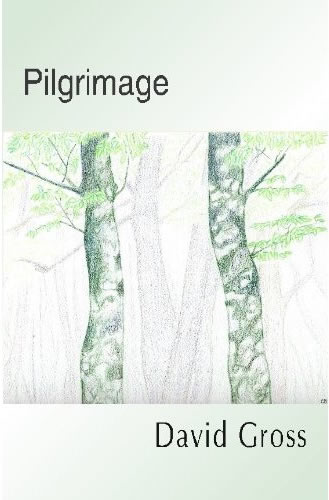Book Review
Pilgrimage by David Gross, Finishing Line Press, 2009. $12
Review by Judith Barisonzi
Pilgrimage by David Gross is a chapbook you’ll read slowly, meditatively. You’ll read it over and over, savoring its small offerings. It’s an invitation to the experience of place, a declaration of rootedness.
Gross lives in the foothills of the Illinois Ozarks. It’s a place both familiar and unfamiliar to a reader like me, from the northwoods of Wisconsin. Just like in Wisconsin, there are small farms, taverns, wood stoves, old quilts, fish fries. Just like in northern Wisconsin, weather matters, especially rain and drought, and life can be hard. In Gross’s Ozarks, a dusty cow “ambles the streambed./Head held low/spread horns/witching water” (“Drought,” p. 16); a thirsty heron mistakes a tin roof for a pond (“Dry Season,” p. 17), and farmers “wonder how much longer/they can outwit the bank” (“Sowing Spring,” p. 12).
But I only wish I could see my woods as clearly as Gross sees his, in such fine, surprising detail, such as the snow geese that “sound like a roomful of quilting women” (“Flyway,” p. 11). It’s the small things that matter, both in the human world—a drunken friend, “splattered with hot sauce/knocking out the windshields of ‘scab pipefitters/up from Alabama” (“Hushpuppies,” p. 6)—and the nonhuman, where a rat snake has an “exquisite spine” (“Neighbor,” p. 15), and a snake falling from the grip of a hawk is a “knotted ribbon” (“Reprieve,” p. 18).
We can already hear Gross’s voice in the book’s first poem, “Gleaners”:
We wake to the clamor of their labor
their speech nasal and insistent.
They have filled the undressed trees
clothed as moonless night
and now in gray dawn
they ravage the fields
cut close by combines.
Like little Charlie Chaplins
they scour the earth
for what is left behind
overturn leaves for fallen treasure.
work their way over stubbled hills
burst into erratic flight
spreading in shapeless scarves
across the morning sky
fill bare branches with black leaves
appeal to us by the actions
to be frugal
not squander this land;
then they move on. (p. 3)
At first I’m not sure if I’m in a human world—are these farm laborers? No, of course not, they’re blackbirds! And look at all the wonderful ways Gross tells us this—little Charlie Chaplins, shapeless scarves, bare branches filled with black leaves. Notice, too, the short lines, each a separate phrase; the fondness for alliteration; the minimal punctuation; the Robert-Frost-plain words. And finally there is the lesson, the bond between humans and birds—not intrusive moralizing, but just there.
It’s a lesson Gross has learned well. He doesn’t squander words:
Every year
the hymns
thin.
Receding water.
We have to walk
deeper into the forest
to worship. (“Frog Pond,” p. 19)
And that’s just what Gross does: he worships, and he keeps going deeper:
Some of us never came out of the woods
but drifted deeper into hungry brambles
found doorways into the soil
stayed to cultivate our spirits.
We blended into the landscape
built small fires in the dead of winter
stared into the windows of stars
carried the old stories within us.
Of when oak supported the heavens
and animals were not afraid of men
when cold springs ran with light
and our hands shaped clay to carry it in.
Now we ripen with the grain
have children who are looking for the way out
while we wander deeper into thickets
looking for the path in. (“Pilgrimage,” p. 25)
Going deeper, for Gross, means connecting with the “old stories,” the stories of early Americans, “men connected to the seasons/who read the moon and stars,” men who are now “swallowed in time” (“Woodhenge,”p. 7). But if the men are gone, the natural world remains:
an arrowhead of snow geese rises
and wavers across the horizon
like smoke from a thousand year old campfire. (“Woodhenge,” p. 7).
And the stories, the signs, remain as well. A snake falls from the grip of a hawk, for instance, “and calligraphy loops through the sky” (“Reprieve,” p. 18); worms leave signatures (p. 24); the body of a dead snapping turtle is “its ancient text” (Turtle Soup,” p. 9). Nature speaks in glyphs ( p. 24), and if we can read aright, everyday objects are transfigured. Corn growing, for example, isn’t just corn; it’s
. . the milky corn maiden
who has whispered all summer
from the tall, thirsty rows of green.
And harvesting is a communion with both the past and the natural world:
Stripping the green sheath back
down to the sweet, yellow honeycomb
ancient avenues bricked with gold. (“Cornhusking,” p. 21)
David Gross knows what matters. So join him on his pilgrimage, for a few minutes, an hour, a day. You’ll go back to your own pilgrimage refreshed, with clearer eyes. Perhaps, like him, you will find the borders of everyday objects blurred,
an old front porch adrift
in the Milky Way. (“Why We Stay,” p. 26)
Judith Barisonzi has been a Wisconsin resident since 1966, and she now lives among the lakes and woods of northwest Wisconsin. Semi-retired from teaching English at the University of Wisconsin Colleges, she gives workshops in creative writing and memoir writing, participates in several local writing groups, and publishes poems in local and national magazines.


